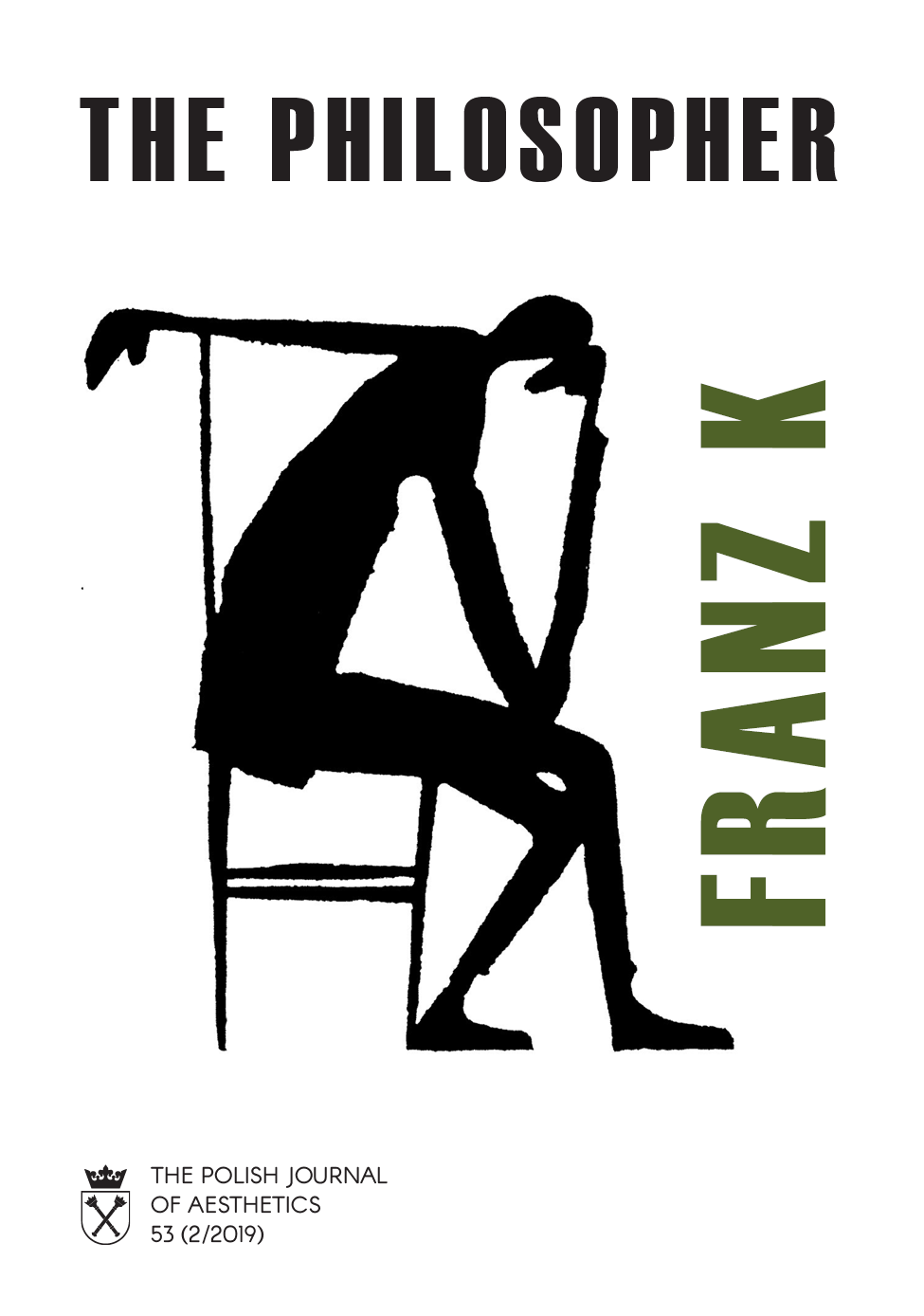Numer 53 (2/2019)
The Philosopher Franz K.|
Spis treści
Strony
Pobierz
|
|||||
|
|
|||||
|
INFORMACJE O AUTORACH Sonia Kamińska Uniwersytet Jagielloński w Krakowie Barry Smith University at Buffalo, New York, USA |
|||||
|
Aoileann Ní Éigeartaigh
“How Can One Take Delight in the World Unless One Flees to It for Refuge?”: The Fear of Freedom in Erich Fromm and Franz Kafka
DOI: 10.19205/53.19.1
15 – 31
|
|||||
|
Słowa kluczowe Franz Kafka |Erich Fromm |freedom |individualStreszczenie Erich Fromm points to a tendency whereby the numerous freedoms gained by the citizens of modern democracies have been accompanied by widespread feelings of loneliness and disconnection. The loosening of traditional social structures leads some individuals to seek out restrictions, for example in order to counteract the feelings of being alone. This essay uses Fromm’s thesis as a lens through which to examine two of Franz Kafka’s novels in which the protagonists exemplify the “fear of freedom” proposed by Fromm. Society in these novels is perceived as a prison cell in which one must comply with social regulations, but also a fortress to which one can retreat from the chaos of the outside world, albeit at the cost of one’s psychological health. INFORMACJE O AUTORZE
Dundalk Institute of Technology, Irlandia
|
|||||
|
Charlene Elsby
Gregor Samsa’s Spots of Indeterminacy: Kafka as Phenomenologist
DOI: 10.19205/53.19.2
33 – 49
|
|||||
|
Słowa kluczowe phenomenology |Ingarden |ontology |Schematized Aspects |IndeterminacyStreszczenie Kafka’s presentation of Gregor Samsa in Metamorphosis is explicable using Ingarden’s ontology of the literary work of art. The common heritage of Kafka’s and Ingarden’s theoretical commitments (Franz Brentano) might explain the conceptual parallel. More importantly, an Ingardenian analysis of Gregor Samsa demonstrates that (1) Kafka is at least implicitly aware of some of the central tenets of later phenomenology and uses them to literary advantage; and (2) Ingarden’s ontology of the literary work of art works particularly well in the case of Kafka’s novel, which provides an example of some of the analysis’ more obscure aspects (in particular, Ingarden’s concept of spots of indeterminacy). INFORMACJE O AUTORZE
Purdue University Fort Wayne, USA
|
|||||
|
Katarzyna Szafranowska
Metaphormosis: The Machinic Metaphor in Kafkian Animal Stories
DOI: 10.19205/53.19.3
51 – 67
|
|||||
|
Słowa kluczowe metaphor |Franz Kafka |Gilles Deleuze |short stories |metamorphosisStreszczenie In my paper, I discuss the Deleuzian reading of Franz Kafka. I argue that Deleuze perceives Kafka’s works through the prism of his own criticism of metaphor and that in this case one cannot dismiss the use of metaphorical language as Deleuze and Guattari attempt to do in Kafka. Toward A Minor Literature. Analyzing the narration of Kafkian animal stories, I claim that metaphors do appear in Kafka’s works but they are broken, dysfunctional metaphors: more a metaphormosis than a metaphor itself. INFORMACJE O AUTORZE
Uniwersytet Warszawski
|
|||||
|
Markus Kohl
Kafka on the Loss of Purpose and the Illusion of Freedom
DOI: 10.19205/53.19.4
69 – 90
|
|||||
|
Słowa kluczowe Franz Kafka |freedom |Søren Kierkegaard |meaningStreszczenie I argue that Kafka’s writings express the idea that our sense of freedom is deceptive. It is deceptive because we cannot discern any proper purpose or destination that would allow us to make truly meaningful choices. Kafka’s thought here relates to the existentialist view of Kierkegaard, but it radicalizes that view by depriving it of its teleological dimension. INFORMACJE O AUTORZE
University of North Carolina, Chapel Hill, USA
|
|||||
|
Matthew Wester
Before Adolf Eichmann: A Kafkian Analysis of the ‘Banality Of Evil’
DOI: 10.19205/53.19.5
91 – 107
|
|||||
|
Słowa kluczowe Arendt |Kafka |Banality of Evil |Eichmann |Crimes against HumanityStreszczenie Arendt’s account of Adolf Eichmann as acting only out of banal intentions remains controversial. I supplement our understanding of the “banality of evil” by demonstrating that Arendt also meant it to describe a factual social arrangement characterized by a form of false consciousness. I apply an original interpretation of Kafka’s The Trial to Eichmann in Jerusalem, and I show that Eichmann’s trial was “before” him in the same way as the Kafkian man from the country is “before” the Law. INFORMACJE O AUTORZE
South Texas College, USA
|
|||||
|
Ido Lewit
“He Couldn’t Tell the Difference between The Merry Widow and Tristan and Isolde”: Kafka’s Anti-Wagnerian Philosophy of Music
DOI: 10.19205/53.19.6
109 – 123
|
|||||
|
Słowa kluczowe Franz Kafka |Richard Wagner |Philosophy of Music |transcendence |Acousmatic Sound |silenceStreszczenie This essay exposes an anti-Wagnerian philosophy of music in Franz Kafka’s “Researches of a Dog” and “The Silence of the Sirens.” Themes of music, sound, and silence are overwhelmingly powerful in these stories and cannot be divorced from corporeal and visual aspects. These aspects are articulated in the selected texts in a manner that stands in stark opposition to Richard Wagner’s philosophy of music as presented in the composer’s seminal 1870 “Beethoven” essay. INFORMACJE O AUTORZE
Yale University, USA
|
|||||
|
|
|||||

